- Home
- Ian Fleming
Diamonds Are Forever Page 7
Diamonds Are Forever Read online
Page 7
Page 7
6
IN TRANSIT
IT was six o’clock on Thursday evening and Bond was packing his suitcase in his bedroom at the Ritz. It was a battered but once expensive pigskin Revelation and its contents were appropriate to his cover. Evening clothes; his lightweight black and white dog-tooth suit for the country and for golf; Saxone golf shoes; a companion to the dark blue, tropical worsted suit he was wearing, and some white silk and dark blue Sea Island cotton shirts with collars attached and short sleeves. Socks and ties, some nylon underclothes, and two pairs of the long silk pyjama coats he wore in place of two-piece pyjamas.
None of these things bore, or had ever borne, any name-tags or initials.
Bond completed his task and proceeded to fit his remaining possessions, his shaving and washing gear, Tommy Armour on How to Play your Best Golf all the Time, and his tickets and passport into a small attache case, also of battered pigskin. This had been prepared for him by Q Branch and there was a narrow compartment under the leather at the back which contained a silencer for his gun and thirty rounds of -25 ammunition.
The telephone rang. He assumed it was the car, early at the rendezvous, but it was the hall porter saying that there was a representative of ‘Universal Export’ with a letter to be delivered personally to Bond.
“Send him up,” said Bond, wondering.
A few minutes later he opened the door to a man in plain clothes whom he recognized as one of the messengers from the pool at Headquarters.
“Good evening, Sir,” said the man. He took a large plain envelope out of his breast pocket and handed it to Bond. “I am to wait and take this back when you have read it, Sir. ”
Bond opened the white envelope and broke’ the seal of the blue envelope which it contained.
There was a page of blue typewritten foolscap paper with no address and no signature. Bond recognized the extra-large type used in M’s personal communications.
Bond waved the messenger to a chair and sat down at the writing desk opposite the window.
Washington [said the memorandum] reports that Rufus B. Saye is an alias for Jack Spang, a suspected gangster who was mentioned in the Kefauver Report but who has no criminal record. He is, however, twin brother to Seraffimo Spang and joint controller of the ‘Spangled Mob’ which operates widely in the United States. The brothers Spang bought control of the House of Diamonds five years ago ‘as an investment’, and nothing unfavourable is known about this business, which appears to be perfectly legitimate.
The brothers also own a ‘wire service’ which serves off-the-course bookmakers in Nevada and California, and is, therefore, illegal. The name of this is the Sure Fire Wire Service. They also own the Tiara Hotel in Las Vegas, and this is the headquarters of Seraffimo Spang and also, to benefit from the Nevada tax laws, the company offices of the House of Diamonds.
Washington adds that the Spangled Mob is interested in other illegal activities such as narcotics and organized prostitution, and these lines are handled from New York by Michael (Shady) Tree who has five previous convictions for various offences. The gang has branch headquarters in Miami, Detroit and Chicago.
Washington describes the Spangled Mob as one of the most powerful gangs in the United States with excellent protection in State and Federal governments and with the police. With the
Cleveland Outfit and the Detroit ‘Purple’ gang, the Spangled Mob has top classification.
Our interest in these matters has not been divulged to Washington, but in the event that your inquiries lead you into dangerous contact with this gang, you will report at once and be withdrawn from the case which will then be handed over to the FBI.
This is an order.
The return of this document in a sealed envelope will acknowledge your receipt of this order.
There was no signature. Bond ran his eyes down the page again, folded it, and placed it in one of the Ritz envelopes.
He got up and handed the envelope to the messenger.
“Thanks very much,” he said. “Can you find your own way downstairs?”
“Yes, thank you, Sir,” said the messenger. He went to the door and opened it. “Good night, Sir. ”
“Good night. ”
The door closed quietly. Bond walked across the room to the window and looked out over Green Park.
For a moment he had a clear vision of the spare, elderly figure sitting back in his chair in the quiet office.
Give the case to the FBI? Bond knew M meant it, but he also knew how bitter it would be for M to have to ask Edgar Hoover to take a case over from the Secret Service and pick Britain’s chestnuts out of the fire.
The operative words in the memorandum were ‘dangerous contact’. What constituted ‘dangerous contact’ would be a matter for Bond to decide. Compared with some of the opposition he had been up against, these hoodlums surely wouldn’t count for much. Or would they? -Bond suddenly remembered the chunky, quartz-like face of Rufus B. Saye. Well, at any rate it could do no harm to try and get a look at this brother with the exotic name. Seraffimo. The name of a night-club waiter or an ice-cream vendor. But these people were like that. Cheap and theatrical.
Bond shrugged his shoulders. He glanced at his watch. 6. 25. He looked round the room. Everything was ready. On an impulse, he put his right hand under his coat and drew the . 25 Beretta automatic with the skeleton grip out of the chamois leather holster that hung just below his left armpit. It was the new gun M had given him ‘as a memento’ after his last assignment, with a note in M’s green ink that had said, You may need this.
Bond walked over to the bed, snapped out the magazine, and pumped the single round in the chamber out on to the bedspread. He worked the action several times and sensed the tension on the trigger spring as he squeezed and fired the empty gun. He pulled back the breech and verified that there was no dust round the pin which he had spent so many hours filing to a point, and he ran his hand down the blue barrel from the tip of which he had personally sawn the blunt foresight. Then he snapped the spare round back into the magazine, and the magazine into the taped butt of the thin gun, pumped the action for a last time, put up the safe and slipped the gun back under his coat.
The telephone rang. “Your car’s here, Sir. ”
Bond put down the receiver. So here it was. The ‘off’. He walked thoughtfully over to the window and looked out again across the green trees. He felt a slight emptiness in the stomach, a sudden pang at cutting the painter with those green trees that were London in high summer, and a loneliness at the thought of the big building in Regent’s Park, the fortress which would now be out of reach except to a call for help which he knew it would not be in him to make.
There was a knock on the door and, when a page came in for his bags, Bond followed him out of the room and along the corridor, and his mind was swept clean of everything except what waited at the mouth of the pipeline that lay open for him outside the swing-doors of the Ritz Hotel.
It was a black Armstrong Siddeley Sapphire with red trade plates. “You’d like to sit up front,” said the uniformed chauffeur. It was not an invitation. Bond’s two bags and his golf clubs were put in the back. He settled himself comfortably and, as they turned into Piccadilly, he examined the face of the driver. All he could see was a hard, anonymous profile under a peaked cap. The eyes were concealed behind black sun goggles. The hands that expertly used the wheel and the gears wore leather gloves.
“Just relax and enjoy the ride, Mister. ” The accent was Brooklyn. “Don’t bother with conversation. Makes me nervous. ”
Bond smiled and said nothing. He did as he was told. Forty, he thought. Twelve stone. Five feet ten. Expert driver. Very familiar with London traffic. No smell of tobacco. Expensive shoes. Neat dresser. No five o’clock shadow. Query shaves twice a day with electric razor.
After the roundabout at the end of the Great West Road, the driver pulled in to the side. He opened the glove compartment and carefully
removed six new Dunlop 65’s in their black wrapping paper, and with the seals intact. Leaving the engine idling in neutral, he got out of the front seat and opened the rear door. Bond looked over his shoulder and watched the man unstrap the ball-pocket on his golf bag and, one by one, carefully add the six new balls to the miscellaneous old and new ones the pocket already contained. Then, without a word, the man climbed back into the front seat and the drive continued.
At London Airport, Bond unconcernedly went through the luggage and ticket routine, bought himself the Evening Standard, allowing his arm, as he put down his pennies, to brush against an attractive blonde in a tan travelling suit who was idly turning the pages of a magazine and, accompanied by the driver, followed his luggage through to the customs.
“Just your personal effects, Sir?”
“Yes. ”
“And how much English money have you. Sir?”
“About three pounds and some silver. ”
“Thank you, Sir. ” The blue chalk made a scribble on the three bags, and the porter picked up the suitcase and clubs and loaded them on a trolley. “Follow the yellow light to Immigration, Sir,” he said and wheeled the trolley off towards the loading bay.
The driver gave Bond an ironical salute. The smudge of two eyes met his for a moment through the dark glass of the goggles and the lips narrowed in a thin smile. “Good night, Sir. Pleasant trip. ”
“Thank you, my man,” said Bond cheerfully, and had the satisfaction of seeing the smile vanish as the driver turned and walked quickly away.
Bond picked up his attaché case, showed his passport to a pleasant, fresh-faced young man who ticked his name off the passenger list, and walked through into the Departure Lounge. Just behind him, he heard Tiffany Case’s low voice say “Thank you” to the fresh-faced young man, and a moment later she also came into the lounge and chose a seat between him and the door. Bond smiled to himself. It was where he would have chosen to sit if he had been tailing someone who might have second thoughts.
Bond picked up his Evening Standard and casually examined the other passengers over the top of it.
The plane would be nearly full (Bond had been too late to get a sleeping berth) and he was relieved to see that among the forty people in the lounge there was not a face he recognized. Some miscellaneous English, two of the usual nuns who, Bond reflected, seemed always to be flying the Atlantic in the summer-Lourdes, perhaps-some nondescript Americans, mostly of the businessman type, two babies in arms . to keep the passengers from sleeping, and a handful of indeterminate Europeans. A typical load, decided Bond, while admitting that if two of their number, himself and Tiffany Case, had their secrets, there was no reason why many of these dull people should not also be bound on strange missions.
Bond felt that he was being watched, but it was only the blank gaze of two of the passengers he had put down as American businessmen. Their eyes shifted casually away, and one of them, a man with a young face but prematurely white hair, said something to the other and they both got up, picked up their Stetsons, which, although it was summer, were encased in waterproof covers, and walked over to the bar. Bond heard them order double brandies and water, and the second man, who was pale and fat, took a bottle of pills out of his pocket and swallowed one down with his brandy. Dramamine, guessed Bond. The man would be a bad traveller.

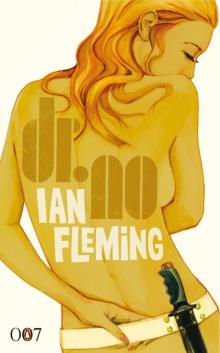 Doctor No
Doctor No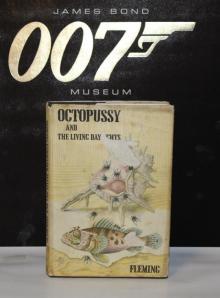 Octopussy & the Living Daylights
Octopussy & the Living Daylights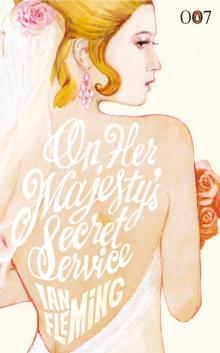 On Her Majestys Secret Service
On Her Majestys Secret Service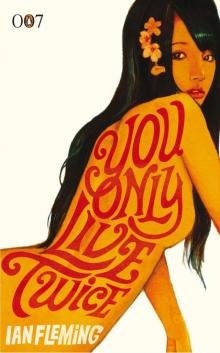 You Only Live Twice
You Only Live Twice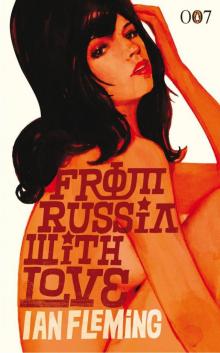 From Russia With Love
From Russia With Love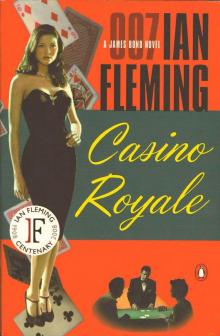 Casino Royale
Casino Royale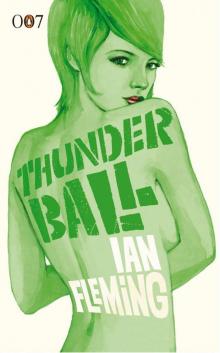 Thunderball
Thunderball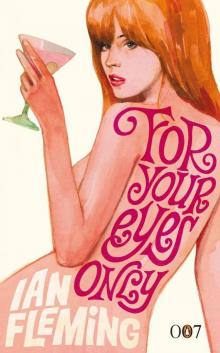 For Your Eyes Only
For Your Eyes Only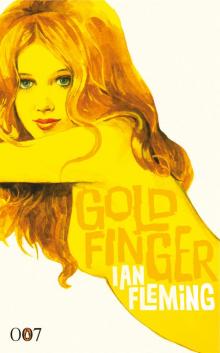 Goldfinger
Goldfinger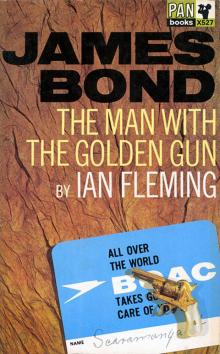 The Man With the Golden Gun
The Man With the Golden Gun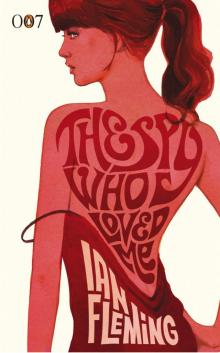 The Spy Who Loved Me
The Spy Who Loved Me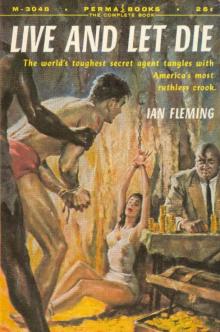 Live and Let Die
Live and Let Die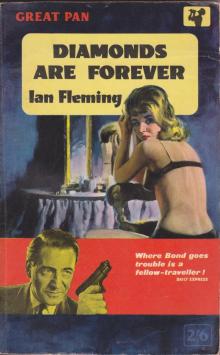 Diamonds Are Forever
Diamonds Are Forever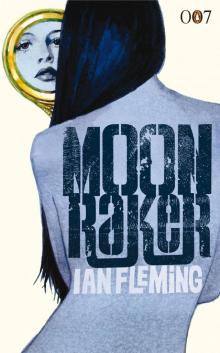 Moonraker
Moonraker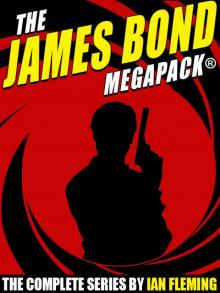 The James Bond MEGAPACK®
The James Bond MEGAPACK®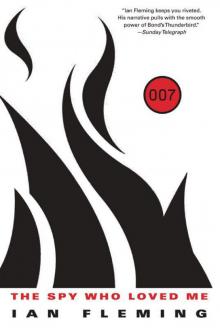 Bond 10 - The Spy Who Loved Me
Bond 10 - The Spy Who Loved Me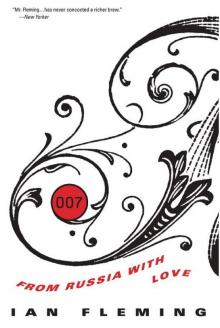 From Russia with Love (James Bond - Extended Series Book 5)
From Russia with Love (James Bond - Extended Series Book 5)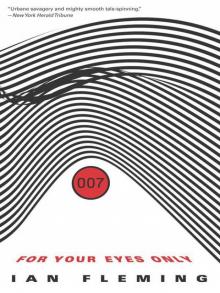 Bond 08 - For Your Eyes Only
Bond 08 - For Your Eyes Only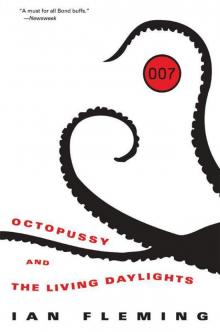 Bond 14 - Octopussy and the Living Daylights
Bond 14 - Octopussy and the Living Daylights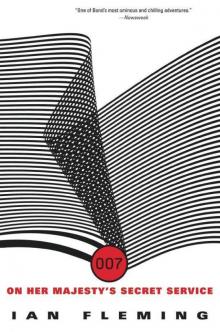 Bond 11 - On Her Majesty's Secret Service
Bond 11 - On Her Majesty's Secret Service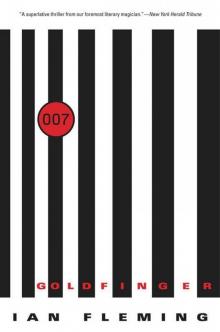 Bond 07 - Goldfinger
Bond 07 - Goldfinger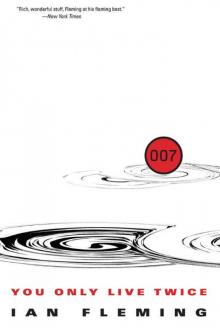 Bond 12 - You Only Live Twice
Bond 12 - You Only Live Twice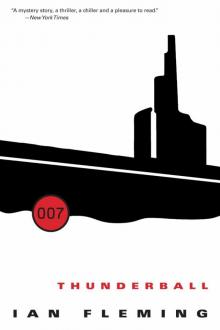 Bond 09 - Thunderball
Bond 09 - Thunderball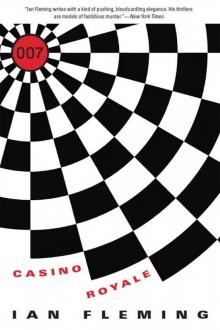 Bond 01 - Casino Royale
Bond 01 - Casino Royale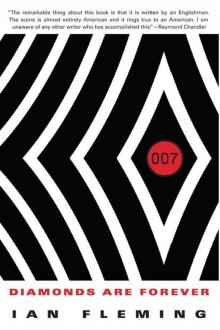 Diamonds are Forever (James Bond - Extended Series Book 4)
Diamonds are Forever (James Bond - Extended Series Book 4)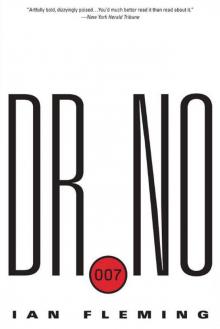 Bond 06 - Dr. No
Bond 06 - Dr. No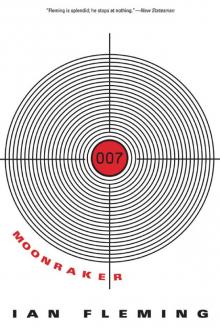 Moonraker (James Bond - Extended Series Book 3)
Moonraker (James Bond - Extended Series Book 3)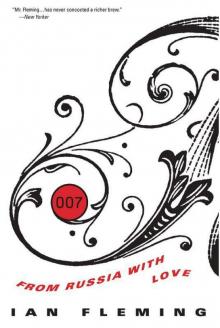 Bond 05 - From Russia With Love
Bond 05 - From Russia With Love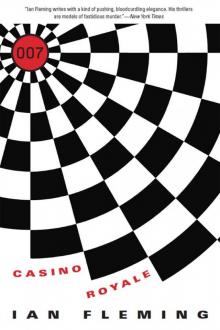 Casino Royale (James Bond - Extended Series Book 1)
Casino Royale (James Bond - Extended Series Book 1)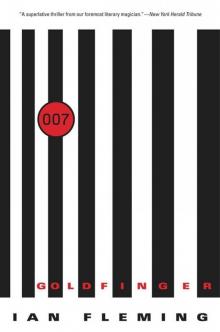 Goldfinger (James Bond - Extended Series Book 7)
Goldfinger (James Bond - Extended Series Book 7)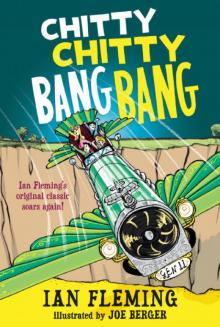 Chitty Chitty Bang Bang: The Magical Car
Chitty Chitty Bang Bang: The Magical Car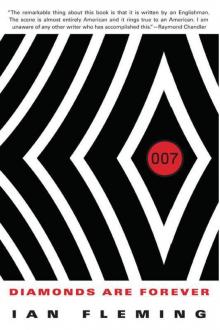 Bond 04 - Diamonds Are Forever
Bond 04 - Diamonds Are Forever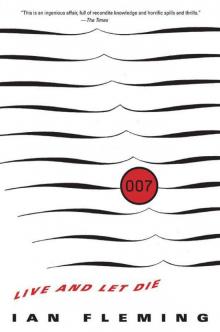 Bond 02 - Live and Let Die
Bond 02 - Live and Let Die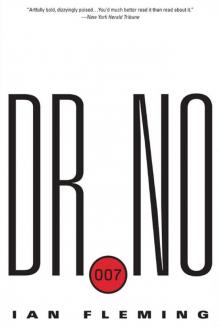 Dr. No (James Bond - Extended Series Book 6)
Dr. No (James Bond - Extended Series Book 6)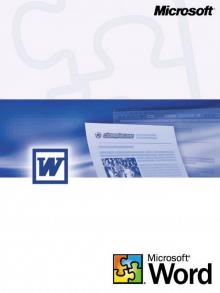 The Hildebrandt rarity
The Hildebrandt rarity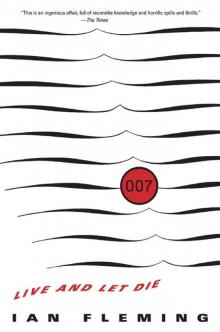 Live and Let Die (James Bond - Extended Series Book 2)
Live and Let Die (James Bond - Extended Series Book 2)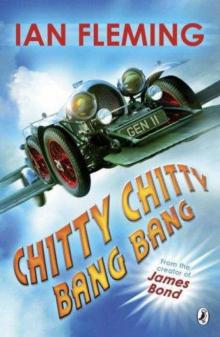 Chitty Chitty Bang Bang
Chitty Chitty Bang Bang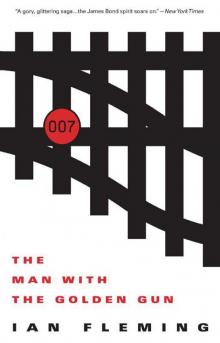 Bond 13 - The Man With the Golden Gun
Bond 13 - The Man With the Golden Gun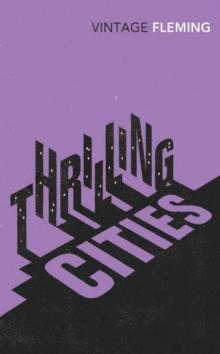 Thrilling Cities
Thrilling Cities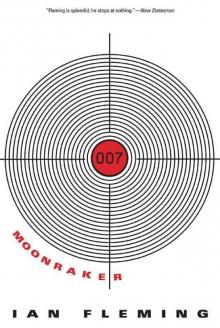 Bond 03 - Moonraker
Bond 03 - Moonraker